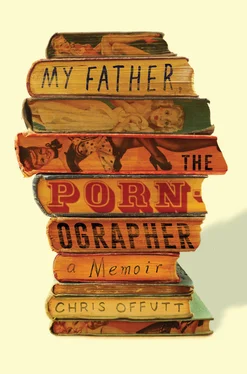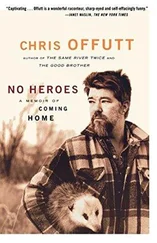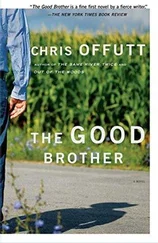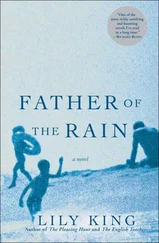I went outside and used a ladder to climb onto the narrow porch roof. The closed shutters were screwed permanently into the brick. No secret door existed. There was just a man standing alone on a roof, facing a wall.
FOR MOST people, childhood is a refuge of simpler times. The increasing responsibilities of adulthood imbue the past with innocence and joy — a seemingly endless summer, the vastness of a night sky, winter’s fade to the bouyancy of spring. Childhood improves as we age and get further away from it. Not so for my father. He rarely talked of his early years except in dark tones, with the occasional anecdote or an obliquely bitter reference. The story of his youth is vague, shrouded in pain and difficulty.
Dad was born in 1934, at the height of the Great Depression. The Offutt family owned a farm near Taylorsville, with a large main house and a log cabin for sharecroppers. To save the farm from repossession by the bank, my grandparents rented out the main house and moved into the cabin, where Dad spent his formative years. Only two artifacts survive from his life on the farm, the oldest being a certificate from the Louisville Courier-Journal proclaiming him the winner of the Spencer County Spelling Bee in 1944. The second is a 1946 photograph of Dad and his sister standing on rocky ground in summer. They wear overalls and straw hats. Visible in the background is their log home, the joints so heavily chinked with white cement that the structure appears to be horizontally striped. Dad faces the camera with an expression of dissatisfaction.
He returned to the farm once, forty years later, asking me to accompany him. Dad drove very fast, his wrists crossed at the top of the steering wheel, severely limiting his ability to maneuver the car. I tilted my seat back and breathed slowly for the first half hour before offering to drive. That way, I said, you can navigate and look around at the old familiar turf. As a former salesman, Dad was a malleable mark — he admired the calm logic of persuasion. I drove the rest of the way and he talked nonstop, a recounting of memory soaked in sorrow.
The log house was hot in summer and cold in winter. Dad was shy as a kid, sensitive and withdrawn, a bookworm and mama’s boy with no interest in sports. He despised the tedious labor of dairy farming. Dad didn’t like his father, who, in his early forties, began wearing shirts of a floral design and going to town at odd hours. A large bouquet of roses arrived anonymously at his funeral. When Dad told me this, I assumed my grandfather had a girlfriend in town. But Dad concluded that his father was a latent homosexual and the roses had come from a man. I nodded, thinking that Dad’s need to eliminate his father’s influence was so great that he chose the worst-case scenario for rural men of his generation. Nevertheless, Dad had two positive memories.
At age ten, he joined his father and a neighbor on a hunting venture, armed with a.22-caliber rifle. A scared rabbit began its unpredictable hopping flight. Dad snapped off a shot and killed it with an incredibly lucky bullet. His father was inordinately proud of him — less for having hit the rabbit and more for having done so in front of his neighbor. Dad never hunted again, preferring to end as he began, with utter perfection. The only other positive interaction occurred during the depths of a brutally cold winter. My grandfather took Dad outside to urinate against the barn wall with him, side by side. The twin streams slowed to slush as they ran down the oak boards, freezing to ice before reaching the ground.
After leaving the farm, Dad attended the University of Louisville on an academic scholarship from the Ford Foundation. The plan was for smart people from disadvantaged circumstances to skip their senior year in high school and enroll in college. Dad suited all the requirements and had just won a Kentucky-wide fiction-writing contest for a short story called “The Devil’s Soul.”
During Dad’s sophomore year, his father died suddenly at age forty-five. His mother sold the car and found work at a bank. Dad responded by embracing college life and constructing a new identity. He took up smoking, drinking, and playing cards. He became president of his fraternity. For two years he was in the Air Force Reserve Officer Training Corps, hoping to be a pilot, until his color-blindness prevented him from flying. He was editor and cartoonist for Static, the AFROTC campus periodical, and editor for The Cardinal, the student newspaper. In his senior year Dad won a national science fiction contest sponsored by If magazine, his first professional publication.
On the way to Taylorsville, Dad and I got lost several times on dirt roads that petered out to walls of forest. Late in the day, at the end of a freshly paved road, we discovered the farm’s main house. Past that was the log cabin. I parked and we approached on foot. The walls were fully intact, the corners still notched tightly together after 150 years. The windows were gone and poison oak covered the front. The roof was caved in. The floor had rotted away and trees grew within, their branches swaying above the walls. My father stared silently for a long time at the ruin. He didn’t move. I understood that he was looking at the cabin but seeing something else.
I left him alone and wandered the land, trying to imagine his early years. The terrain of western Kentucky is very different from the hills in the east. Spencer County is part of the Salt River Basin, a rolling landscape with a vast expanse of sky and wind rustling the hay fields. On all sides the land slowly rose to meet the horizon as if the farm sat inside a wide and shallow bowl. I could see why he left and never returned. He’d grown up in a crater.
The land surrounding the cabin was too overgrown to enter, the yard a tangle of brush and weeds. We walked to the old barn, which was in better shape, having been maintained for use. Six feet tall with long legs, Dad always walked at a fast pace. Now he moved slowly, as if in a fugue state, somnolent but highly alert, taking in everything. He stared at the hayloft for a long time and finally spoke: “I made my sister jump out of there once. Dad didn’t like it. Made me kneel on rocks all day.”
He walked the length of the barn, peering into each stall, then stepped outside. I followed him. He unzipped his pants. We stood side by side and urinated against the old oak boards, then got in the car and left. We made the drive home without talking, the longest period I ever saw him silent. He never mentioned the trip again.
The deprivation and indignity of growing up during the Depression imprinted my father with intense frugality. Dad salvaged narrow slivers of soap, the grimy remains of bars that he rescued before the water rinsed them down the sink. He dampened each piece and formed a new chunk of soap, lined with dirt and hair. He placed it by the sink, where it lay untouched, hardening as it dried, cracking into dark fissures.
My father didn’t trust banks and disliked large government. After his death I found small bundles of cash tucked away in various areas of the house, and enough canned food, liquor, and ammunition to survive a prolonged siege. In the early years of writing, he was often broke or nearly so and had legal trouble with the IRS. My aunt and grandmother had set up a college fund for my siblings and me, but Dad took the money for himself. He sold my comic book collection of fifteen hundred titles and kept the proceeds. My brother changed his mailing address after Dad cashed his college financial aid check.
My siblings and I grew up with the specter of the Depression and our father’s belief in its return. For our future benefit, he stockpiled gold, silver, and jewels. Each time I visited home, Dad took me aside to deliver private information about his hiding places, always with an attitude of utmost secrecy and the implication that he was telling me and only me. When the time comes , he said, his voice lowered for dramatic effect, and it will . He told me to search the furnace vents. He pointed to the top of a custom-designed bookshelf in his office, the molding of which concealed three secret compartments. Up there, he said. Gold for the family. I felt honored by his confidential tone, his trust.
Читать дальше












